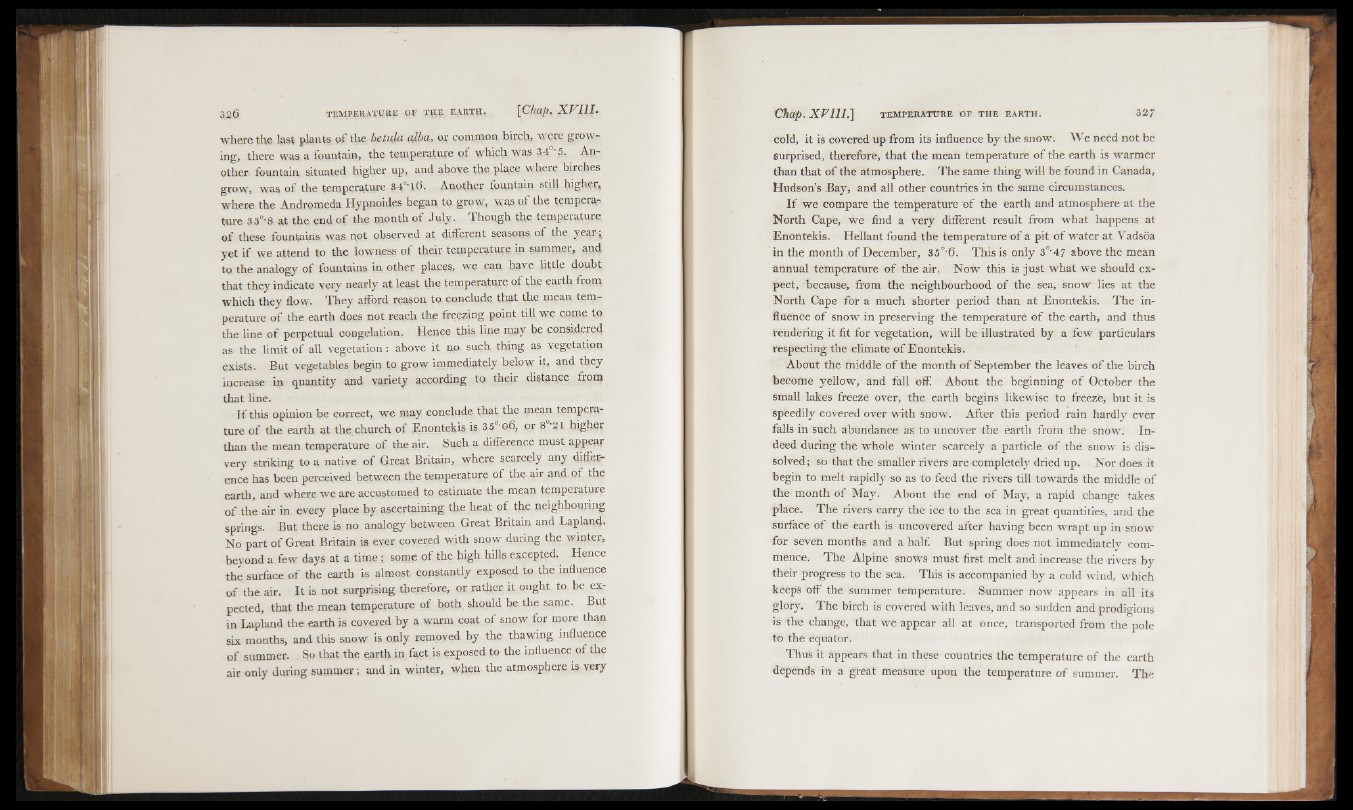
where the lust plants of the hciuXa alba, o.f comnion birch* '■veve g row
ing, there was a fountain, the temperature of which was 3,4°-5, Another
fountain, situated higher up, and above the pl^ce where birches
grow, was of the temperature 3<-f6. Another fountain still higher,
where the Andromeda Ilypnoides began to grow, was of the tempera-,
ture 33°-a at the end of the month of July. Though the temperature
of these fountains was not observed at different seasons of the, yesr;
yet i f we attend to the lowness of their temperature in summer, and
to the analogy of fountains in other places, we can have little doubt
that they indicate very nearly at least the temperature of the earth from
which they flow. They afford reason to conclude that the mean temperature
of the earth does not reach the freezing point till we come to
the line of perpetual congelation. Hence this line may be considered
as the limit of all vegetation : above it nP such thing as vegetation
exists. But vegetables begin to grow immediately below it,, and they
increase in quantity and variety according to their distance from
that line.
I f this opinion be correct, we may conclude that the mean temperature
of the earth at the church of Enontekis is 35°'o6, or 8 21 higher
than the mean temperature of the air- Such a difference must appear
very striking to a native of Great Britain, where scarcely any difference
has been perceived between the temperature of the air and of the
earth, and where w e are accustomed to estimate the mean temperature
o f the air in every place by ascertaining the heat o f the neighbouring
springs. But there is no. analogy between Great Britain and Lapland-
No part of Great Britain is. ever covered with snow during the winter,
beyond a few days at a time ; some o f the high hills excepted, Hence
the surface of the earth is almost constantly exposed to the influence
o f the air. It is not surprising therefore, or rather it ought to be , expected,
that the mean temperature of both should be the same- Bui
in Lapland the earth is covered by a warm coat of snow for more than
six months, and this snow is only removed by the thawing influence
of summer. So that the earth in. fact is exposed to the influence of the
air only during summer; and in winter, when the atmosphere is very
cold, it is covered up from its influence by the snow. We need not be
surprised, therefore, that the mean temperature o f the earth is warmer
than that of the atmosphere. The same thing will be found in Canada,
Hudson’s Bay, and all other countries in the same circumstances.
I f we compare the temperature of the earth and atmosphere at the
North Cape, we find a very different result from what happens at
Enontekis. Hellant found the temperature of a pit of water at Yadsoa
in the month o f December, 35°-6. This is only 3° 4 7 above the mean
annual temperature o f the air. Now this is just what we should expect,
because, from the neighbourhood of the sea, snow lies at the
North Cape for a much shorter period than at Enontekis. The influence
o f snow in preserving the temperature o f the earth, and thus
tendering it fit for vegetation, will be illustrated by a few particulars
respecting the climate of Enontekis.
About the middle o f the month o f September the leaves o f the birch
become yellow, and fall off About the beginning o f October the
small lakes freeze over, the earth begins likewise to freeze, but it is
speedily covered over with snow. After this period rain hardly ever
falls in such abundance as to uncover the earth from the snow. Indeed
during the whole winter scarcely a particle o f the show is dissolved;
so that the smaller rivers are completely dried up. Nor does it
begin to melt rapidly so as to feed the rivers till towards the middle of
the month of May. About the end of May, a rapid change takes
place. The rivers carry the ice to the sea in great quantities, and the
Surface of the earth is uncovered after having been wrapt up in snow
for seven months and a half. But spring does not immediately commence.
The Alpine snows must first melt and increase the rivers by
their progress to the sea. This is accompanied by a cold wind, which
keeps off the summer temperature. Summer how appears in all its
glory. The birch is covered with leaves, and so sudden and prodigious
is the change, that we appear all at once, transported from the pole
to the equator.
Thus it appears that in these countries the temperature o f the earth
depends in a great measure upon the temperature of summer. The